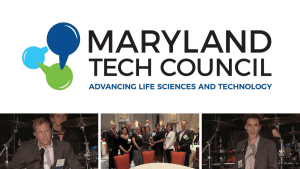
Annual BioHealth Capital Region Forum Showcases Robust Growth Across 4th Largest Biopharma Cluster
By Alex Keown
The Sixth Annual BioHealth Capital Region Forum brought together industry leaders from across the region who discussed the accomplishments and strengths of the region as its member companies continue to innovate new therapies and medicines in one of the strongest bio-hub regions in the United States.
The forum, which drew more than 1,100 registrants and included 59 world-class speakers and panelists, had a different look this year due to the ongoing COVID-19 pandemic. Instead of gathering together in the heart of the BioHealth Capital Region at AstraZeneca’s Gaithersburg facility, the forum was held virtually. The event offered multiple panels and keynotes that highlighted advancements made in the region across several areas, including cell and gene therapies, the use of artificial intelligence and the ongoing battle against COVID-19.
Rich Bendis, President, and CEO of BioHealth Innovation noted that nearly $7 billion dollars in investments over the past six months has flooded the BioHealth Capital Region, a top-four biopharma cluster in the U.S., in the last several months due to federal funding of multiple COVID-19-related therapeutics in development. Bendis made the comment during a fireside chat with former U.S. Rep. Jim Greenwood, who recently stepped down from his role as President and CEO of Biotechnology Innovation Organization (BIO) after 16 years. Greenwood, who now serves as a Senior Policy Advisor for DLA Piper, said it was no accident that the BioHealth Capital Region has seen such an influx of investment capital.
“I’ve been watching this process for a long time now and I’ve seen how the region has just focused on all of the economic development tools to attract the business, to attract the talent and it’s paid off in spades,” Greenwood said.
While a wide-range of topics were discussed, Greenwood, a champion of the life sciences, suggested the industry is at its greatest moment scientifically to date given the promise of gene and cell therapies, as well as immunotherapies such as CAR-T treatments in hematological cancers – many of which are in development in the BioHealth Capital Region. Greenwood also praised the pharmaceutical industry for its rapid response to the global pandemic, calling it a “spectacular outpouring” of effort in developing diagnostics, therapeutics and vaccine candidates.
The forum kicked off with remarks from Maryland Secretary of Commerce Kelly Schulz who touted the state’s “thriving life sciences and biotechnology sector” as one of its biggest selling-points in attracting new business. Maryland’s life sciences business generates more than $18 billion in annual revenue and provides approximately 45,000 jobs that pay about $4.9 billion in annual wages.
“The life sciences is one of Maryland’s most powerful economic assets,” she said.
The state of Maryland and the region have taken a leading role in combating COVID-19, she said. Nearly 40 Maryland biopharma companies have secured more than $5 billion in financing to support the development and manufacturing of vaccines, therapeutics and diagnostics in response to the virus, Schulz noted.
Further opening remarks were delivered by Marc Elrich, Montgomery County, Maryland County Executive and Daniel Carey, M.D., Secretary of Health and Human Resources in the Commonwealth of Virginia.
In the first keynote address of the day, Sandeep Patel, the director of the division of Research, Innovation, and Ventures (DRIVe) at BioMedical Advanced Research and Development Authority (BARDA), discussed investing in the future of health security. The BARDA division was developed to tackle health security issues in order to cut off future threats that can disrupt healthcare before they happen through entrepreneurial partnerships. One of the issues Patel pointed to is sepsis, an infection that occurs in about 1.7 million people in the U.S. each year and results in about 270,000 deaths. Based on a Medicare analysis, Patel said sepsis has a $60 billion economic cost.
“It’s one of these huge issues where it affects everything BARDA is interested in, it affects a lot of the healthcare system, but there has not been a concerted effort to develop advanced technologies to address it,” he said.
The afternoon Keynote speaker of the conference, Pam Cheng, executive Vice President of Global Operations and IT at AstraZeneca, addressed the global combat against COVID-19. She said the numbers are depressing when you see that thousands of people are dying from the virus each day. Cheng noted that the pandemic has gone beyond simply being a global health crisis and pointed to economic impacts, shortages of household goods, lost productivity and gaps in learning due to school shutdowns and more. Cheng pointed to AstraZeneca’s responses to the virus, including its clinical vaccine program, which is currently paused for a safety investigation. She said the company is focused on ensuring continuity of care and patient safety during the pandemic all while maintaining a continued supply of medications.
New and interesting panel topics were added to this year’s Forum including “Clinical Trials in the Future” moderated by Ouzama Henry, Head of Clinical Development, GSK and “BioHealth Marketing – Pre-Launch and Beyond Promotional/Advertising” moderated by Rebecca Burnett of Framework Solutions. Other panel discussions throughout the day focused on various highlights of the region over the past year. Some of the discussions were centered on day-to-day business operations, such as growing and retaining a vibrant workforce and wooing investors. Others focused on some of the key strengths of the region, including expansions from the pharmaceutical industry and the growing threat of infectious diseases.
For obvious reasons COVID-19 became a central focus for the industry this year and the panel on combating infectious diseases provided an overview of the region’s role in combating the virus. Interestingly, the topic for the conference was chosen last winter, before the outbreak of the novel coronavirus, said Karen Smith, Chief Medical Officer of Emergent BioSolutions. Company representatives participating in this panel pointed to the work conducted by their organizations in COVID, as well as other infectious diseases, including Ebola, influenza, RSV and SARS. The companies involved in the panel, Novavax, Emergent BioSolutions, BioFactura and Aperiomics, highlighted their research into the diseases comprising this space. Interestingly, the panel focused on Infectious Diseases was part of the original agenda before the COVID-19 Pandemic hit.
Vivek Shinde, Vice President of Vaccine Clinical Development for Novavax, said the whole company has shifted from developing a next-generation seasonal influenza product to bringing a vaccine for COVID-19 to market. Over the course of the year, the company’s manpower has doubled to more than 400 people in order to rapidly meet this need.
While many diagnostics companies rapidly shifted to address COVID-19, Aperiomics CEO Crystal Icenhour said her company initially left that need to the larger companies, given the resources and high throughput they had at their disposal. That quickly changed though when it was realized how much testing would actually be needed in the United States to combat the virus. They diverted some resources to developing a COVID test and are now shifting their focus back to core leveraging their own technologies to develop a more universal diagnostics for infectious disease.
During the panel that focused on new pharmaceutical expansions in the BioHealth Capital Region, Kurt Newman, President and CEO of Children’s National Hospital, pointed to a significant expansion of the hospital, including the renovation of a former federal facility that will provide needed research space. Newman said the new innovation center will provide the foundation for an ecosystem that is attracting partners such as Virginia Tech and Johnson & Johnson’s JLabs. This center will house the hospital’s own researchers, such as its genetics research team, as well as provide working space for the 20 companies that have been spun out of the hospital. Construction on the new center has continued throughout the pandemic and is expected to be open in 2021. Newman called this a rich environment for success to move the life sciences forward in the region.
Johnson & Johnson’s JLabs @ Washington, D.C. will set up shop in the expanded space at the hospital. The incubator will assume 32,000 square-feet of space to provide startups a hard infrastructure and access to capital for their businesses.
Closing out the day, Bendis pointed to the rich ecosystem of the BioHealth Capital Region and said it was “the place to be” for those who wanted to be involved in the cutting-edge work being conducted in the life sciences industry.
If you’re not here, you need to be here,” he said. “If anybody is looking for a location to land, this is a great place to land if you want to be in the bio-health industry.”
No date has been set yet for the 2021 BioHealth Capital Region due to the uncertainty of the ongoing pandemic. Bendis said a decision will be made at a later time. A replay of the 6th Annual BioHealth Capital Region is currently available online by visiting https://eventmobi.com/biohealth2020, registering, and accessing the Agenda. The individual recordings of panels, keynotes, and the fireside chat will also be shared throughout the rest of 2020 to help foster continued conversation.




